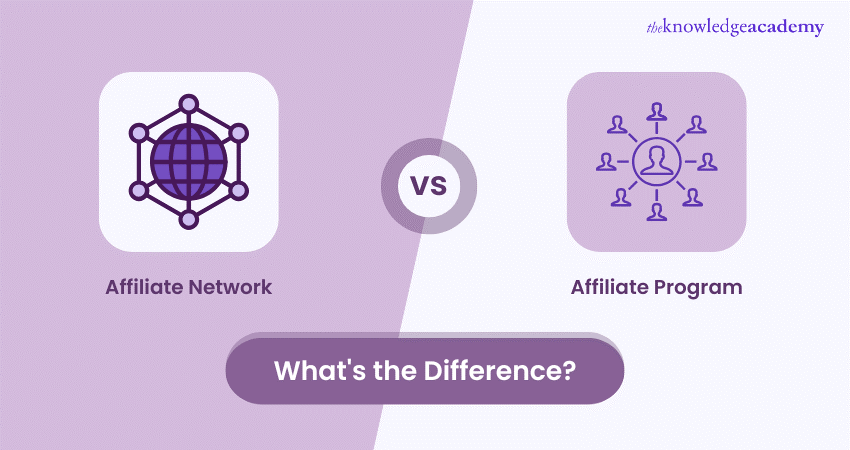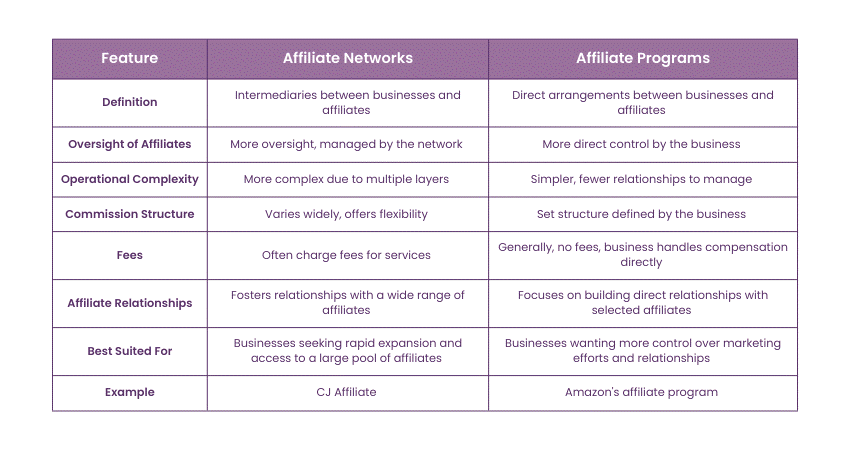We may not have the course you’re looking for. If you enquire or give us a call on +44 1344 203999 and speak to our training experts, we may still be able to help with your training requirements.
Training Outcomes Within Your Budget!
We ensure quality, budget-alignment, and timely delivery by our expert instructors.

Confused about which one to choose between, an affiliate network or an affiliate program for your marketing efforts? Both serve as crucial mechanisms to promote your products and services through the approach of the middle person acting as a facilitator.
Choosing between them depends widely on your goals and resources. In this blog, we will understand the key differences between Affiliate Network vs Affiliate Program to help you decide the reliable choice for your marketing strategies. So, let's ignite our journey!
Table of Contents
1) What is an Affiliate Network?
2) What is an Affiliate Program?
3) Affiliate Network vs Affiliate Program: Key Differences
a) Definition
b) Oversights of Affiliates
c) Operational Complexity
d) Commission Structure
e) Fees
4) Conclusion
What is an Affiliate Network?
An affiliate network is an online platform that connects businesses to individuals or companies (affiliates) who can sell their products or services by promoting them on their website through a unique affiliate link. So, whenever a user clicks on that unique link, the affiliate receives a commission from the product's original seller.

Advantages of Affiliate Network
Affiliate networks do much more than connecting businesses and affiliates; they help simplify tracking and enable diverse promotions. Below, we have described the key benefits of Affiliate Network:
a) Affiliate networks offer businesses access to a broad affiliate population, further expanding their reach without extensive marketing efforts.
b) It can easily handle the tracking and management of affiliate performance, simplifying campaign monitoring and strategy optimisation.
c) Affiliates gain opportunities to promote various products from multiple merchants in one place.
Disadvantages of Affiliate Network
In addition to the benefits, affiliate networks pose a few disadvantages such as reduced profits and brand control. Below, we have elaborated these limitations:
a) Businesses devise certain fees such as commissions to affiliates and the network itself, which can reduce profit margins.
b) Strong competition among affiliates can raise business-related costs as they may need to increase payouts to attract top performers.
c) Budgeting for marketing campaigns becomes more difficult, possibly lowering overall return on investment (ROI).
d) Businesses risk a lack of control over brand representation, as multiple affiliates may not accurately convey the brand’s message or values.
e) Inconsistent marketing by affiliates can lead to confusion among customers and reduce brand identity.
f) Businesses must trust affiliates to represent their products effectively, which can be a concern if affiliates don’t align with the brand’s standards.
What is an Affiliate Program?
An affiliate program is an affiliate marketing arrangement where businesses pay people (affiliates) for promoting their products (as discussed earlier). In exchange, Affiliates earn a commission for each lead they generate from their advertising campaigns and website clicks.
Advantages of Affiliate Program
Affiliate Program is a cost-effective marketing approach, helping expand the product/service reach and boost sales. Below, we have described these benefits further:
a) Affiliate programs allow businesses to expand their marketing reach without affecting the costs, as affiliates promote products on their behalf.
b) This performance-based model ensures businesses only pay for the results affiliates generate, making it a cost-effective strategy.
c) They can increase brand awareness by utilising affiliates’ audiences that trust their recommendations.
d) It can help improve overall sales performance for businesses.
Disadvantages of Affiliate Program
Unlike benefits, affiliate programs have limitations, including lack of control over their brand representation and messaging, which could overwhelm customers. We have elaborated these limitations below:
a) Potential lack of control over how affiliates represent the brand, leading to inconsistent messaging or poor brand alignment. This risk can confuse customers and harm the brand’s reputation.
b) Managing an affiliate program can be time-consuming and resource-intensive. This includes tracking affiliate performance, processing payments, and providing support.
c) If not properly managed, an affiliate program might not be able to deliver the desired results, leading to wasted resources and missed opportunities.
Enhance conversion tracking techniques with our Performance Marketing Training- register now!
Affiliate Networks vs Affiliate Programs: Key Differences
Affiliate networks and affiliate programs differ widely based on their structure, management, and commission models. Below, we have described those differences in detail:

Join the elite digital marketing experts list with our Digital Marketing Course- join today!
1) Definition
Affiliate Network
Affiliate networks connect businesses with a large pool of affiliates who can promote their products.
Affiliate Program
Affiliate programs are direct arrangements where a business establishes its own relationships with individual affiliates to drive sales.
2) Oversight of Affiliates
Affiliate Network
Affiliate networks handle the recruitment, management, and monitoring of affiliates through representing businesses, ensuring that they follow marketing guidelines.
Affiliate Program
Affiliate programs, businesses are responsible for overseeing their own affiliates, which allows for more personalised relationships but requires more effort.
3) Operational Complexity
Affiliate Network
Affiliate networks can introduce greater complexity because they involve multiple parties, including the network itself, businesses, and various affiliates. This can lead to more intricate processes for tracking and managing performance.
Affiliate Program
Affiliate programs are typically more straightforward, enabling businesses to manage fewer relationships directly.
4) Commission Structure
Affiliate Network
Affiliate networks often feature flexible commission structures that can be tailored to different affiliates and campaigns. This flexibility allows businesses to incentivise high-performing affiliates.
Affiliate Program
Affiliate programs usually have a predefined commission structure set by the business, which can offer consistency but may limit the ability to negotiate.
Master conversion rate optimisation techniques- sign up for ours Customer Acquisition Training!
5) Fees
Affiliate Network
Affiliate networks typically charge fees for their services, including a percentage of the commissions earned by affiliates. These fees can add to businesses' overall marketing expenses.
Affiliate Network
Affiliate programs may have little to no fees, allowing businesses to compensate affiliates directly without the extra costs associated with a network.
6) Affiliate Relationships
Affiliate Network
Affiliate networks provide businesses access to various affiliates (who have registered on Affiliate network platform), which can enhance marketing reach and diversify promotional strategies.
Affiliate Program
In contrast, affiliate programs focus on cultivating direct relationships with selected affiliates, allowing for deeper collaboration and alignment with the brand's values.
7) Best Suited For
Affiliate Network
Affiliate networks are particularly beneficial for businesses that want to quickly expand their market presence and tap into many affiliates without managing each relationship in detail.
Affiliate Program
Affiliate programs are better suited for businesses that prefer more control over their affiliate marketing efforts and wish to build strong and direct partnerships.
8) Example
Affiliate Network
CJ Affiliate is an example of an affiliate network, which connects various brands with numerous affiliates to promote their products.
Affiliate Network
Amazon's affiliate program allows individuals to promote Amazon products directly and earn commissions on sales generated through their links, fostering a direct relationship between Amazon and the affiliates.
Conclusion
We hope you understand the Affiliate Network Vs Affiliate Program differences. Understanding the differences between them is essential to uplift your effective marketing strategies. Therefore, to take a clearer picture, here is a summary— choose an affiliate network for broader reach and ease of management, while an affiliate program is ideal for those seeking direct control and deeper relationships with affiliates.
Optimise campaign performance with our Influencer Marketing Course – book your seats now!
Frequently Asked Questions

Affiliate networks make money by charging services fees from businesses, which are typically the sales percentage generated through affiliates. Moreover, they also earn through setup fees, monthly subscriptions, and performance-based commissions.

The best platform for affiliate marketing often depends on your niche and goals. Popular options include Amazon Associates, CJ Affiliate, ShareASale, and ClickBank.

The Knowledge Academy takes global learning to new heights, offering over 30,000 online courses across 490+ locations in 220 countries. This expansive reach ensures accessibility and convenience for learners worldwide.
Alongside our diverse Online Course Catalogue, encompassing 19 major categories, we go the extra mile by providing a plethora of free educational Online Resources like News updates, Blogs, videos, webinars, and interview questions. Tailoring learning experiences further, professionals can maximise value with customisable Course Bundles of TKA.

The Knowledge Academy’s Knowledge Pass, a prepaid voucher, adds another layer of flexibility, allowing course bookings over a 12-month period. Join us on a journey where education knows no bounds.

The Knowledge Academy offers various Digital Marketing Courses, including Affiliate Marketing Course, Digital Marketing Course, and Influencer Marketing Course. These courses cater to different skill levels, providing comprehensive insights into Performance Marketing vs Digital Marketing.
Our Digital Marketing Blogs cover a range of topics related to digital marketing strategies, offering valuable resources, best practices, and industry insights. Whether you are a beginner or looking to advance your marketing skills, The Knowledge Academy's diverse courses and informative blogs have got you covered.
Upcoming Digital Marketing Resources Batches & Dates
Date
 Affiliate Marketing Course
Affiliate Marketing Course
Fri 27th Dec 2024
Fri 3rd Jan 2025
Fri 28th Mar 2025
Fri 23rd May 2025
Fri 4th Jul 2025
Fri 5th Sep 2025
Fri 24th Oct 2025
Fri 5th Dec 2025







 Top Rated Course
Top Rated Course



 If you wish to make any changes to your course, please
If you wish to make any changes to your course, please


